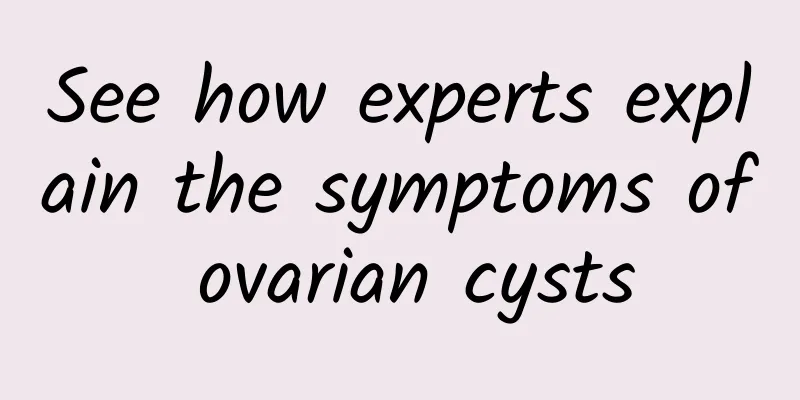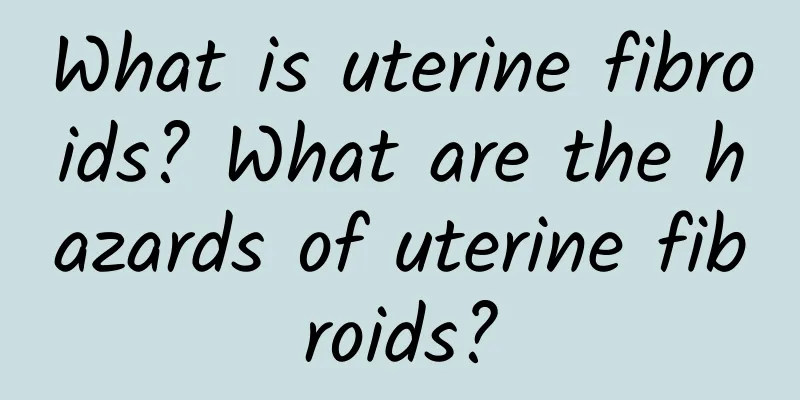See how experts explain the symptoms of ovarian cysts

|
"What are the symptoms of ovarian cysts?" Many people must have this question. Ovarian cysts are a common disease. Now, let the experts introduce the symptoms of ovarian cysts to you. I hope it can help you better understand the symptoms of ovarian cysts . 1. Symptoms of ovarian cysts include lower abdominal discomfort, which is the initial symptom before the patient feels a lower abdominal mass. Due to the weight of the tumor itself and the influence of intestinal peristalsis and body position changes, the tumor moves in the pelvic cavity, involving its pedicle and pelvic funnel ligament, causing the patient to feel fullness and falling in the lower abdomen or iliac fossa. 2. Increased abdominal circumference and abdominal mass are the most common symptoms. The patient feels that her clothes or belt are too tight, and she has just noticed the enlargement of her abdomen, or she feels it by chance in the morning, so she presses her abdomen and finds a mass in her abdomen, plus abdominal distension and discomfort. These are the symptoms of ovarian cysts. 3. Abdominal pain If the tumor has no complications, there is very little pain. Therefore, if patients with ovarian tumors feel abdominal pain, especially if it occurs suddenly, it is mostly due to the twisting of the tumor pedicle, or occasionally due to tumor rupture, bleeding or infection, which is also a symptom of ovarian cysts. In addition, malignant cysts often cause abdominal pain and leg pain, and the pain often causes patients to seek emergency treatment. 4. Menstrual disorders Ovarian cysts, even bilateral ovarian cysts, usually do not cause menstrual disorders because they do not destroy all normal ovarian tissues. Some uterine bleeding is not endocrine, but may be caused by ovarian tumors that change the pelvic blood vessels, causing endometrial congestion; or by ovarian malignant tumors that directly metastasize to the endometrium. Menstrual disorders caused by endocrine tumors are often combined with other secretory effects. 5. Compression symptoms Huge ovarian tumors can cause dyspnea and palpitations due to compression of the diaphragm. Ovarian tumors combined with large amounts of ascites can also cause such symptoms. However, some ovarian tumor patients have dyspnea due to unilateral or bilateral pleural effusions. And often combined with ascites, forming the so-called Meigs syndrome, which is also a symptom of ovarian cysts. Through the above introduction, everyone should have a better understanding of the symptoms of ovarian cysts. I hope everyone can get rid of the pain caused by ovarian cysts as soon as possible, and welcome everyone to continue to consult experts for more knowledge. |
<<: Help everyone understand the common treatment methods for irregular menstruation
>>: What are the main aspects of the examination of ovarian cysts?
Recommend
How to take care of patients with ovarian cysts?
Among gynecological diseases, ovarian cyst is one...
A brief explanation of the knowledge on dysmenorrhea treatment
Dysmenorrhea is a physiological phenomenon that m...
What are the causes of polyovarian cyst syndrome?
Polycystic ovary syndrome (PCOS) is a syndrome ch...
What are the precautions for cervical erosion? What are the precautions for postoperative physical conditioning for patients with cervical erosion?
What precautions should women take in their daily...
What is black discharge? Women should be alert to black discharge in 3 situations
If black secretions flow out of the vagina, it de...
What medicine should I take after medical abortion? Doctors recommend these 4 medicines
Because medical abortion often causes heavy bleed...
What does threatened miscarriage mean?
Threatened miscarriage refers to a symptom that o...
Failed to lose weight and gained weight again, the culprit is: the appetite monster strikes back! Oral weight loss medicine to control cravings and avoid weight gain
Have you tried many weight loss methods, but stil...
Is painless abortion harmful to the body?
Painless abortion may cause some harm to the body...
What medicine is effective for women with chronic cervicitis? Two types of medicine are effective in treating chronic cervicitis
Patients with chronic cervicitis need to take loc...
What are the causes of uterine prolapse?
What are the causes of uterine prolapse? Uterine ...
What does inevitable miscarriage mean and what are the causes of inevitable miscarriage?
Inevitable miscarriage is a miscarriage that cann...
Fitness people are crazy about whey protein. 3 major supplement tips to pay attention to
What can you eat to improve your sports and fitne...
What are the characteristics of different types of painless abortion surgery?
Painless abortion is very common in life. In clin...
Experts tell you how to treat ectopic pregnancy?
Ectopic pregnancy, also known as ectopic pregnanc...









